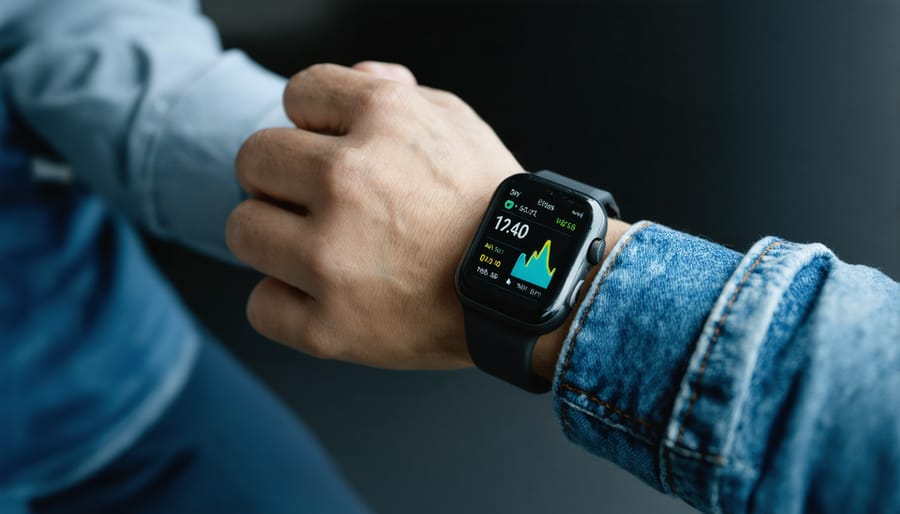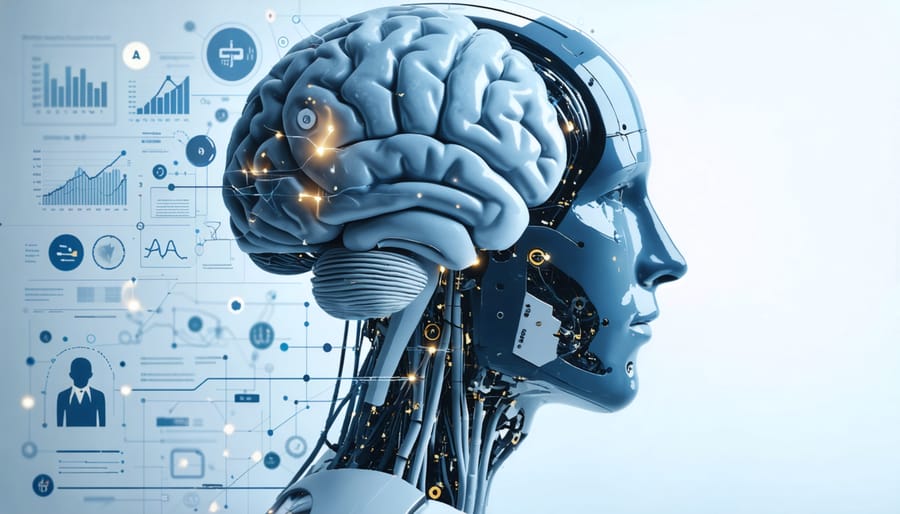In the labyrinth of modern healthcare, AI-powered healthcare solutions are revolutionizing how medical professionals make critical decisions. Every day, artificial intelligence analyzes millions of patient records, medical images, and clinical data points with unprecedented accuracy, transforming split-second choices into data-driven certainties. From emergency rooms to chronic care management, AI algorithms now serve as vigilant partners to healthcare providers, catching subtle patterns that human eyes might miss and suggesting treatment paths backed by vast databases of clinical evidence.
This technological transformation isn’t just about faster decisions – it’s about better ones. When a physician faces a complex diagnosis, AI systems can instantly cross-reference symptoms against thousands of similar cases, offering evidence-based insights that complement human expertise. For patients, this means more personalized treatment plans, reduced medical errors, and improved outcomes. As healthcare systems worldwide grapple with increasing demands and limited resources, AI-assisted decision-making stands as a beacon of hope, promising a future where quality care becomes more accessible, efficient, and precise than ever before.
How AI Transforms Daily Disease Management
Real-Time Health Monitoring
Real-time health monitoring has revolutionized patient care through AI-powered wearables and smart devices. These innovative tools continuously track vital signs, activity levels, and other health metrics, providing both patients and healthcare providers with invaluable data for proactive healthcare management.
Modern wearables can monitor heart rate, blood pressure, oxygen levels, and even detect irregular heart rhythms. Smart watches and fitness trackers now incorporate sophisticated sensors that can identify potential health issues before they become serious. For instance, some devices can detect falls in elderly patients and automatically alert emergency services.
AI algorithms analyze this constant stream of data to identify patterns and predict potential health complications. For diabetic patients, continuous glucose monitors paired with AI can predict blood sugar fluctuations hours in advance, allowing for timely interventions. Similarly, smart patches can track medication adherence and vital signs in cardiac patients, enabling doctors to adjust treatment plans remotely.
These monitoring systems have significantly reduced hospital readmissions and emergency visits by catching complications early. They’ve also empowered patients to take a more active role in managing their health while providing physicians with comprehensive, real-time insights into their patients’ well-being.

Predictive Analytics for Early Intervention
Predictive analytics in healthcare leverages AI algorithms to analyze vast amounts of patient data, identifying potential health risks before they become serious complications. By examining patterns in medical records, vital signs, lab results, and even lifestyle factors, AI systems can flag early warning signs that might escape human observation.
For example, AI models can predict diabetic complications by monitoring blood glucose patterns, medication adherence, and lifestyle data. The system alerts healthcare providers when a patient shows signs of developing problems like diabetic retinopathy or kidney disease, enabling early intervention and preventive care.
These predictive capabilities extend to various conditions, from heart disease to respiratory infections. In hospital settings, AI systems continuously monitor patient vital signs to predict deterioration hours before traditional warning signs appear. This early warning system has proven particularly valuable in intensive care units, where quick intervention can make the difference between life and death.
The technology also helps identify high-risk patients within populations, allowing healthcare providers to implement targeted prevention strategies and allocate resources more effectively. This proactive approach not only improves patient outcomes but also reduces healthcare costs by preventing expensive complications.
Smart Treatment Recommendations
Personalized Treatment Plans
In modern healthcare, AI systems are revolutionizing how doctors develop and adjust treatment plans for their patients. By analyzing vast amounts of patient data, including medical history, genetic information, lifestyle factors, and treatment responses, AI algorithms can help create personalized wellness strategies that are uniquely tailored to each individual.
These AI-powered systems can process information from multiple sources simultaneously, identifying patterns and correlations that might not be immediately apparent to human practitioners. For instance, when treating diabetes, AI can analyze daily blood glucose readings, dietary habits, exercise patterns, and medication adherence to suggest precise adjustments to insulin dosages and lifestyle modifications.
The technology also excels at predicting potential complications and treatment outcomes by comparing a patient’s profile with millions of similar cases. This predictive capability allows healthcare providers to proactively adjust treatment plans, potentially preventing adverse events before they occur.
What makes AI-assisted treatment planning particularly powerful is its ability to continuously learn and adapt. As new patient data becomes available, the system updates its recommendations in real-time, ensuring that treatment plans evolve with the patient’s changing needs. This dynamic approach to healthcare delivery has shown promising results in managing various conditions, from chronic diseases to mental health disorders.
Moreover, these systems can factor in practical considerations such as medication costs, insurance coverage, and local healthcare resource availability, making the recommended treatment plans not just medically sound but also practically feasible for patients to follow.
Medication Management
AI-powered medication management systems are revolutionizing how healthcare providers and patients handle prescription drugs, making the process safer and more efficient. These systems analyze patient data, including medical history, current medications, allergies, and genetic factors, to help prevent dangerous drug interactions and optimize dosing schedules.
Smart medication management platforms can automatically flag potential adverse reactions before they occur, giving healthcare providers crucial information at the point of prescription. For example, if a patient is already taking blood thinners, the system can immediately alert doctors about medications that might increase bleeding risks.
These AI systems also help improve medication adherence by creating personalized reminder systems for patients. They can analyze patterns in a patient’s daily routine and suggest the most effective times to take medications, considering factors like meal times and sleep schedules. Some advanced systems even integrate with smart pill dispensers and mobile apps to provide real-time reminders and track medication compliance.
For healthcare providers managing multiple patients with complex medication regimens, AI assists in monitoring drug effectiveness and suggesting dosage adjustments based on patient response. The technology can identify patterns in patient symptoms and side effects, helping doctors make more informed decisions about medication changes.
Additionally, these systems contribute to cost efficiency by recommending appropriate generic alternatives and helping patients maintain their medication schedules, reducing the likelihood of hospital readmissions due to medication non-compliance.
Patient Engagement and Support
Virtual Health Assistants
Virtual health assistants and AI-powered chatbots are revolutionizing patient care by providing 24/7 support and guidance. These intelligent systems use natural language processing to understand patient queries and deliver personalized responses, making healthcare more accessible and efficient.
These digital assistants can perform various tasks, from scheduling appointments and medication reminders to providing basic health assessments and answering common medical questions. For instance, chatbots can help patients track their symptoms, offer self-care recommendations, and determine when professional medical attention is needed.
Many healthcare providers now integrate these AI assistants into their patient portals and mobile apps. They serve as the first point of contact, helping to triage patients and reduce the burden on medical staff. Some advanced systems can even monitor patient vital signs through connected devices and alert healthcare providers when concerning patterns emerge.
The technology is particularly valuable for managing chronic conditions, where regular monitoring and support are essential. Virtual assistants help patients stay on track with their treatment plans, provide educational resources, and maintain continuous communication with their healthcare team.

Behavioral Change Support
Modern healthcare challenges often stem from maintaining healthy lifestyle changes, but AI-driven behavioral support is revolutionizing how patients stick to their wellness goals. These intelligent systems analyze daily patterns, sending timely reminders and personalized motivation exactly when patients need them most.
Think of AI as a 24/7 wellness coach that learns your habits and adapts to your needs. It can detect when you’re most likely to skip exercise, suggest alternative activities during bad weather, or provide healthy meal options based on your preferences and dietary restrictions. The technology uses smart devices and wearables to track progress, celebrating small wins and offering gentle course corrections when needed.
What makes this approach particularly effective is its ability to predict and prevent relapse behaviors before they occur. By analyzing patterns in sleep, activity levels, and even social interactions, AI systems can identify potential triggers and provide preemptive support. This proactive approach helps patients maintain their health goals more effectively than traditional methods, leading to better long-term outcomes in chronic disease management.
Healthcare Provider Benefits
Clinical Decision Support
In modern healthcare settings, clinical decision support systems powered by AI are revolutionizing how medical professionals make diagnostic and treatment decisions. These intelligent systems analyze vast amounts of patient data, including medical histories, lab results, and imaging studies, to provide evidence-based recommendations in real-time.
Think of AI as a highly knowledgeable assistant that can instantly cross-reference thousands of medical journals, clinical guidelines, and patient cases to help doctors make more informed decisions. For example, when a physician enters a patient’s symptoms and test results, the AI system can quickly identify potential diagnoses, flag important risk factors, and suggest appropriate treatment protocols.
These systems are particularly valuable in emergency settings where quick decisions can save lives. They can alert healthcare providers to potential drug interactions, recommend dosage adjustments based on patient-specific factors, and even predict which patients might be at risk for complications before symptoms appear.
However, it’s important to note that AI doesn’t replace human judgment – instead, it augments it. Doctors remain the ultimate decision-makers, using AI-generated insights as one of many tools in their diagnostic arsenal. This partnership between human expertise and artificial intelligence leads to more accurate diagnoses, fewer medical errors, and better patient outcomes.

Resource Optimization
In today’s healthcare landscape, AI systems are revolutionizing how medical facilities allocate and manage their resources. These intelligent systems analyze vast amounts of hospital data to predict patient admissions, staff requirements, and equipment needs with remarkable accuracy. For instance, AI algorithms can forecast peak emergency room times, allowing hospitals to adjust staffing levels accordingly and reduce wait times.
Resource optimization through AI extends to inventory management as well. Smart systems track medical supplies, medications, and equipment usage patterns, automatically triggering orders when stocks run low. This prevents wastage and ensures critical supplies are always available when needed. In operating rooms, AI helps schedule surgeries more efficiently by considering factors like procedure duration, equipment availability, and surgeon schedules.
AI-powered platforms are particularly effective in managing bed capacity. By analyzing patient flow data, discharge patterns, and incoming admissions, these systems help healthcare providers make informed decisions about bed assignments and transfers. This optimization has led to significant improvements in patient care coordination and reduced length of stay.
Financial resources also benefit from AI oversight. Machine learning algorithms identify billing errors, reduce administrative costs, and highlight areas where resources might be better allocated. Some healthcare facilities report cost savings of up to 30% after implementing AI-based resource management systems, while simultaneously improving patient care quality and staff satisfaction.
The integration of AI-assisted decision-making in healthcare has revolutionized chronic disease management, offering unprecedented opportunities for improved patient outcomes and streamlined healthcare delivery. Through predictive analytics, real-time monitoring, and personalized treatment recommendations, AI systems have demonstrated their ability to enhance both the quality and efficiency of chronic disease care.
The impact is particularly evident in early disease detection, treatment optimization, and patient engagement. Healthcare providers now have powerful tools to identify at-risk patients before conditions worsen, while patients benefit from more personalized care plans and better self-management support. This technological advancement has not only reduced hospital readmissions but has also led to more cost-effective healthcare delivery.
Looking ahead, the future of AI in chronic disease management appears promising. Emerging technologies like federated learning and advanced natural language processing are set to further improve the accuracy and capabilities of AI systems. We can expect to see more sophisticated remote monitoring solutions, enhanced integration with wearable devices, and more nuanced personalized treatment recommendations.
However, success will depend on addressing key challenges, including data privacy concerns, healthcare provider training, and system interoperability. As these technologies continue to evolve, maintaining a balance between innovation and ethical considerations will be crucial for widespread adoption and sustainable implementation in healthcare settings.
The transformation of chronic disease management through AI is not just a technological achievement – it represents a fundamental shift toward more proactive, personalized, and efficient healthcare delivery that benefits both providers and patients.

